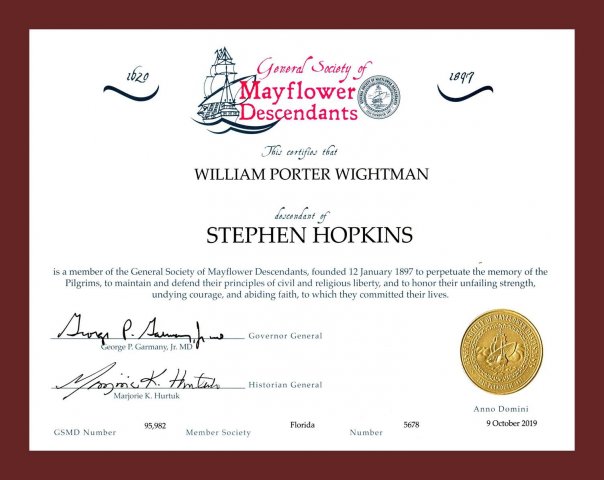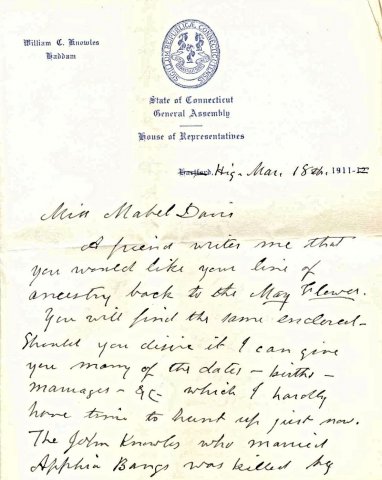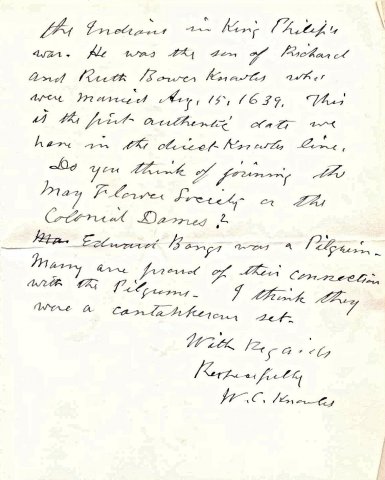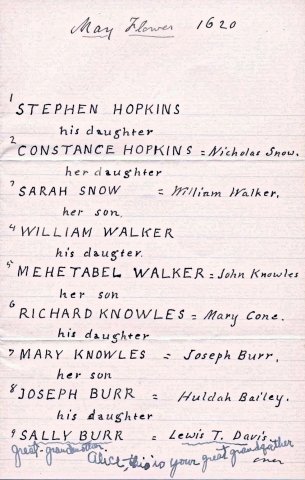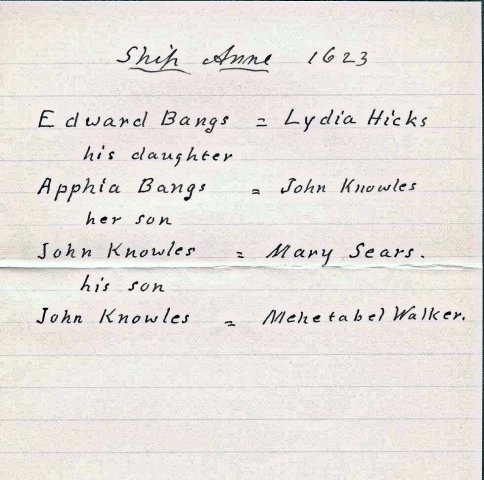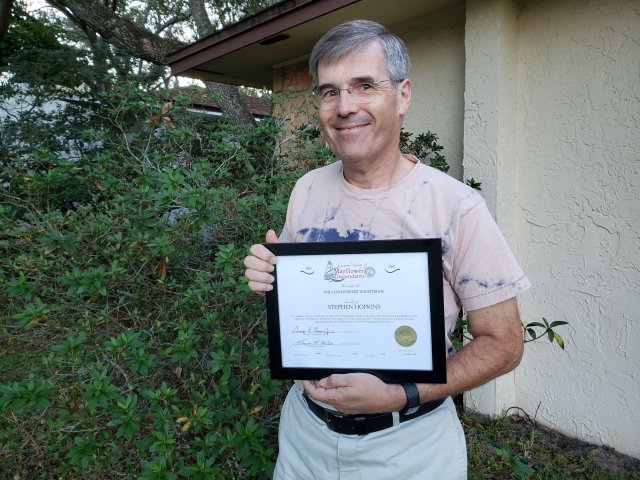It has been a long time coming.
In our family, it began in 1911, with this letter written to Porter's grandmother, Mabel Davis, by William C. Knowles, a member of the Connecticut State House of Representatives. He was her representative, and also a distant relative, but who the friend was who put them in contact we will probably never know. (Click images to enlarge.)
Note his final line: Many are proud of their connection with the Pilgrims. I think they were a cantankerous set. Apparently Stephen Hopkins was cantankerous, at any rate: when Porter was a teenager and let his temper get the best of him, his mother would tell him to stop acting like Stephen Hopkins.
Mabel Davis was 21 years old when she received this letter. As far as we know, she did not apply to the Mayflower or any other hereditary society. She married the following year, and probably found much else that commanded her attention. (Such as bringing the Maggie P. into the family. How much of her personality came from Stephen Hopkins no one knows, but she was a Force to be Reckoned With.)
Many years later, sometime after we first moved to Florida, Porter took up the letter and the genealogical work. However, he also became too busy, and again it languished.
Then came 2002, the year of my father's death, which had followed close on the heels of the death of Porter's mother. I was stunned to realize that most of the people of whom I might ask questions were now out of reach, and the few remaining were well along in years. What's more, it occurred to me that, as the oldest in my family by quite a number of years, I had memories of bygone times that my siblings did not. I had never been interested in history of any sort, but it began to look as if I needed to take action to stem the rapid disappearance of family knowledge.
So I took up the genealogical baton, helped considerably by three significant factors.
- On both sides of the family there had been people of earlier generations who had shown some interest in family history, so I had a few good books and some painstakingly-gathered notes to begin from.
- We were at the time living just outside of Boston, with the tremendous resources of the New England Historic Genealogical Society library just a short train ride away. I can't emphasize enough how important this was to the progress I made. Alas, this season of my research was short, as we moved back to Florida in early 2003, but I made the most of it. In those days before Internet genealogy took off, the books, manuscripts, and human resources of the library were essential; even now, whenever we visit Boston my goal is to spend as much time as possible at the NEHGS. The same is true of New York City: You can have your Broadway shows—give me the New York Public Library's Milstein room.
- While "There's never enough time!" is my constant and continuous refrain, I can't deny that with our youngest child in college, and not being constrained by the demands of employment, the time was finally right for some serious and sustained research.
I took up the baton, it is true, but I ran in my own direction. I grew up with zero interest in family history, and negative interest in heritage societies. My sole desire at that point was to gather data (like Google—data, data, and more data) and to enjoy solving genealogical puzzles. With the help of many people and resources, my family tree grew to nearly 15,000 people. (I hasten to add that this was without tacking on branches from other people's Ancestry.com or Family Search trees, which is how unsourced and incorrect data is spreading like a California wildfire.) I'm still embroiled in the massive challenge of organizing that data and making sure the tree is as accurate and well-documented as possible—as well as continuing to learn more, of course.
Knowing that he had a Mayflower ancestor—actually, at least three different branches that I know of now—Porter expressed an interest in joining the Mayflower Society, because of the upcoming (2020) 400th anniversary of the Landing of the Pilgrims. With all the data I have collected, you'd think that would be an easy job for me to do, so in 2017 I looked into the process and recklessly promised it to Porter as a Christmas present.
But even well-sourced data about a line of descent is not proof, and the Mayflower Society turns out to be particularly rigorous in its requirements. Of Porter's three possible Mayflower lines, I chose Stephen Hopkins because it looked to be the easiest to prove. Maybe it was, but easy it was not.
Now that I've done it once and know the procedures and requirements, it shouldn't take me as long to do another one—assuming the proof is available. (I can't believe I just wrote that; for months I had been intoning, "Never again. Never again. I am never going through this again." I guess it's like childbirth.) This was the gift that kept on giving: Christmas 2017, birthday 2018, Christmas 2018, birthday 2019. We submitted the final application in May of this year, and in October the certificate at the top of this post finally arrived in the mail.
Stephen Hopkins is Porter's 10th great-grandfather. The line is as follows:
Stephen Hopkins—Constance Hopkins—Sarah Snow—William Walker—Mehitabel Walker—Richard Knowles—Mary Knowles—Joseph Burr—Sarah Burr—Julius Davis—Mabel Davis—Alice Porter—Porter Wightman.
As patriarch of the family Stephen naturally gets all the press, but note that in this line Porter actually has two Mayflower ancestors. Stephen's daughter Constance was also a passenger on that ship.
I had figured to use my work once more as a Christmas gift, with the framed certificate wrapped and waiting under the tree. But I soon discovered that I couldn't wait myself—the road had been so long.
And anyway, it's a really appropriate Thanksgiving present.
Congrats!! Question from "Hamilton": "Why do you write like you're running out of time?"
I'm embarrassed to say that I had to look that up. When you first wrote about Hamilton, I wanted to see it RIGHT NOW—when that was impossible. Then it became wildly popular and, contrarian that I am, I decided I could wait. Maybe reading Innovation on Tap will re-inspire me.
In looking up the source of your question, believe I've found the answer: How do you write like tomorrow won't arrive? / How do you write like you need it to survive?
Note that all of my English teachers, if they have survived to read this, are scratching their heads in perplexity.

